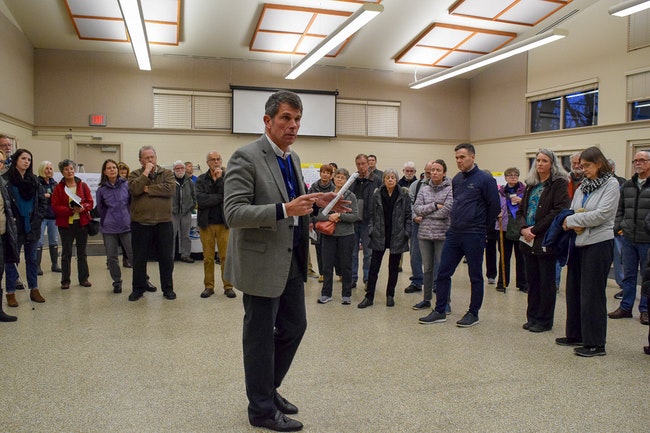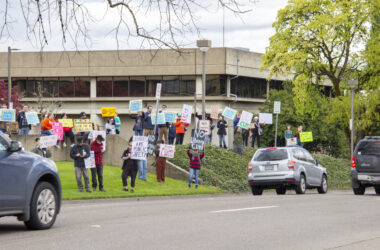
City Manager Steve Powers responds to questions from the a crowd of neighbors in January at Pringle Community Hall. The city later scrubbed plans to turn the hall into an emergency homeless shelter through the end of March. (Saphara Harrell/Salem Reporter)
The pressure to deal with downtown homeless camps in Salem mounted week by week with no ready solution in hand as winter wore on.
Complications emerged at every turn, according to internal city records obtained by Salem Reporter.
A ban on public camping downtown triggered new problems.
Key city officials went on vacation with homeless still grabbing the public spotlight downtown.
A hasty plan to set up emergency shelters hit roadblock after roadblock.
And at least one councilor worried about her safety if homeless residents showed up at her home to protest city actions.
The behind-the-scenes frustrations of city and community leaders emerge in more than 350 pages of city emails from December, released recently under a public records request from Salem Reporter. The city wouldn’t waive any of its $400 fee for providing the records, saying the matter wasn’t of significant public interest.
Homelessness is the biggest issue in Salem. A city-backed survey in October found four out of every 10 residents named it their top issue – ahead of issues like crime, housing, taxes and traffic.
Salem Reporter obtained the emails Jan. 21. City attorneys redacted information on more than 50 pages.
A ‘hasty decision’ unravels
Salem’s camping ban was the linchpin of December’s events. The city law banned tents and other structures from public spaces.
As the law was to take effect, city officials sought to shelter homeless residents whose tents near downtown would soon be illegal. Councilors demanded a report on city-owned properties where camping could still be allowed through March 31.
City employees, the emails show, hoped a plan was in place before the long holiday break. Steve Powers, Salem city manager, sent legal language to other staff to tee up a temporary camp at Wallace Marine Park.
“To help us get through tonight and avoid a special meeting later this year (the mayor and I are both gone starting on the 16th and not returning until January 7 and January 2.” Powers wrote on Dec. 9. “Let me know what you think/changes.”
Just hours later, city councilors scrapped the idea. At a public meeting, they decided instead to pay $213,000 to two churches to open a seven-nights-a-week shelter by Jan. 1.
First Presbyterian Church, one church expected to be part of the expanded shelter network, wasn’t fully aware of the plan.
On Dec. 13, Powers emailed church leaders about the council’s sudden change in plans.
“I regret that the speed of the city’s decision to expand the warming center network has placed you and the First Presbyterian board in the position of having to make a significant decision in a short amount of time,” Powers wrote to Pastor Del Burnett. “Having volunteered at your church, I can appreciate the logistical and operational questions and challenges you and the board must be considered.”
DOCUMENT: City email regarding First Presbyterian
Jimmy Jones, executive director for the Mid-Willamette Valley Community Action Agency, also pleaded for the churches to help. He wrote that the church’s involvement would be short – and state lawmakers planned to bring help later.
“They’re pledging to essentially buy us a dedicated space for warming, but that wouldn’t be something we could have operational until next winter,” Jones wrote on Dec. 17. “If there’s any way that the church could get the homeless community through this 90 days, or part of it, I think we have an answer for next year where the faith community might not have to carry this obligation for the city going forward.”
That night, however, leaders at First Presbyterian Church said no. They would open their doors when temperatures hit freezing, but wouldn’t provide general shelter seven nights a week as councilors intended.
On Dec. 18, Salem police started clearing a large encampment near downtown. Dozens had staked tents around The ARCHES Project, a homeless services provider on Northeast Commercial Street.
While that cleanup was underway, Kristin Retherford, the city’s urban development director, began delivering news to councilors the shelter plan fell apart.
First Presbyterian, she wrote, had “just too much at play right now that makes this too much for them to take on.” She said the idea hadn’t been “fully vetted” when it was proposed by The ARCHES Project, which Jones also oversees.
“Their pastor is retiring in January, they are not fully staffed, and they have board members transitioning off the board,” Retherford wrote. “The combination of short notice and internal transition have led them to conclude that they just don’t have the capacity for this right now.”
“We are rapidly exploring other sites for shelter operations and will provide updates as new information develops.”
As the press pursued reports that churches were not agreeing to a new program, city officials attempted to blunt the news through a press release.
By that afternoon, city communications workers drafted a press release headlined: “Salem Continues to explore Sheltering Options for January through March.”
The two-page press release said that while the church had pulled out of the deal, staff are “reaching out to other churches in the warming shelter network.”
Mayor Chuck Bennett was vacationing when the draft of the city’s announcement reached him. He quickly fired a critique to Retherford.
“This press release is a mess,” Bennett wrote. “I can’t tell what the story is, what the problem is or what the solution or action planned is going to be.”
Retherford responded the next morning. She relayed his thoughts to communications staff, she said, but also told the mayor that messaging wasn’t the whole problem.
“Part of the challenge was that we don’t have a definite solution at this time,” Retherford wrote on Dec. 19.
She noted that the release aimed to let the intensely interested public know other shelters are available to homeless residents.
“Given all of the emails, press and social media posts, there was some time sensitivity to getting this information out and to also provide information on how the community can help,” she wrote.
Councilor Tom Andersen balked at the developments. In an email, he blamed Jones for pitching the idea of the seven-nights-a-week shelters that council chased.
“ARCHES was way out over it skis, which led to a hasty decision by the council,” Andersen wrote. “So now what?”
Scramble before the new year
The next week would be especially busy for city officials. They looked for empty buildings to lease and turn into shelter. Plans also re-emerged, briefly, to sanction camping.
On Dec. 20, two days after clearing out the camp around The ARCHES Project, inspectors identified a building at 676 Church St. N.E. to be an “excellent candidate for an emergency shelter,” the emails show. But the emails don’t explain why the deal didn’t work.
At the same time, now-displaced homeless residents started filtering downtown. Some stationed under awnings and business overhangs to avoid the rain.
“Campers are relocating to Marion Square Park, parking garages, and downtown,” Retherford wrote to councilors that afternoon, just days before Christmas.
The idea of sanctioning a camp resurfaced that afternoon. Retherford warned councilors that “given the rapid timeline,” the camp likely wouldn’t be supervised by the city or anyone else.
Unsupervised camping had its own problems, the emails show. Garbage haulers, for one, didn’t want to service places with “hazardous materials (human waste and numerous needles among other things),” wrote Councilor Chris Hoy in an email. Suppliers of portable toilets also didn’t want to be involved.
That evening, one councilor wondered if council should call a special meeting and repeal the camping ban. Councilor Jackie Leung worried that homeless residents might stage a sit-in near her home.
“Given the controversy and the recent call I received from (Retherford) about the possibility of camping sit-ins outside our residences and concern for my and my family safety, I would like for us to meet sooner rather than later,” Leung wrote to Hoy.
Hoy told her that he asked police to call about her safety concerns.
By Saturday, Dec. 21, ten tents appeared on a state park, where city laws don’t apply, just outside the capitol building. State police responded to tell them the park closed at 10 p.m. Police also reported littering and “health concerns (defecating around and on hardscape of Capitol).”
By the following Monday, the campers had followed police directives to leave their Capitol Mall campsites. Retherford said she expected many would head to the Oregon State Hospital grounds and to Cascades Gateway Park in southeast Salem.
“Is there anything you would like us to share with the press at this point?” asked Kathy Ursprung, a city spokeswoman. “I have been getting calls.”
“Just the same message as from before,” Retherford wrote back. “We are continuing to look at options for a temporary shelter.”
Retherford also noted that police are only evicting tents when a complaint is lodged.
However, homeless residents soon lined up around prominent downtown buildings. One staffer reported 80 sleeping bags around the former Nordstrom building, at the intersection of Liberty and Center streets.
“The trash is pretty bad, along with the smells that occur when that many people, pets, food, etc. are within close proximity of each other,” wrote Sheri Wahrgren, with the urban development department, on Dec. 30.
A week later, Salem declared the sidewalks a health emergency and closed them for cleaning.
No shelter emerged before the new year. On Jan. 8, Jones told Salem Reporter that he and city officials had toured 10 buildings but none could be used for shelter due to a mix of NIMBYism, improper zoning or unwilling landlords.
Emergency declared. What’s next?
Emails supplied in the records end after Dec. 30, but the city continued to grapple with homelessness in the weeks to follow.
For the first time since banning camping, the council on Jan. 14 considered a three-part plan, including declaring an emergency.
With that, the city expected to quickly add a handful of shelter beds to a women’s shelter, set up a car camping program for people who live in their cars, and turn a community center into a 37-bed emergency shelter.
Faced with public opposition, the city shelved the idea of turning Pringle Community Hall and instead turned to a limited car camping program.
City leaders continue to grapple with what to do. In recent weeks, councilors have considered repealing parts of the camping ban.
It’s possible nothing will be resolved before winter is over. On Jan. 21, Powers advised that may be the wise move.
“I won’t say we’ve exhausted all possibilities for this winter, but it really is becoming a real opportunity cost for us,” Powers said.









